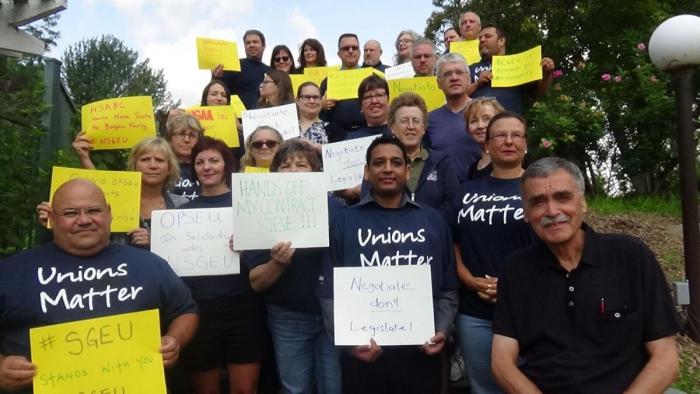This is an archive of news stories and research from the National Union of Public and General Employees. Please see our new site - https://nupge.ca - for the most current information.
"I am so impressed by the participants at the School this year. They engaged honestly and directly with passion and compassion. The future of NUPGE is in good hands with these leaders." — Larry Brown, NUPGE President.
Keene (24 Aug. 2017) — After a week of classes and discussions, 25 elected officers and senior staff of the National Union of Public and General Employees' (NUPGE) Components will graduate from its Leadership Development School on August 24. NUPGE members from across the country gathered to explore issues and ideas about strategic planning, critical thinking and the major challenges facing union leaders today.
25 more graduates
The School as been designed to help Component leadership activists develop keener analytical, problem-solving and campaigning skills, as well as discover ways to deepen public understanding of the value and importance of unions. The setting and structure allows for lectures, small group discussions, study time and time to get to know the other union leaders from different parts of Canada.
A majority of the program is taught by Elaine Bernard, who recently retired as the Executive Director of the Labor and Worklife Program at Harvard Law School. Bernard has taught at every NUPGE Leadership School.
Elisabeth Ballermann, NUPGE Secretary-Treasurer, kicked off the week on August 19 welcoming participants to NUPGE's 19th Leadership Development School. Ballermann led a session that examined the role unions play, not only between workers and employers, but also in broader society. Unions and their leaders have an indispensible political role in civil society, advancing and promoting the social well-being of everyone, not just union members.
Larry Brown, NUPGE President, engaged participants on emerging labour law issues in Canada and union administration and governance. He also led a session talking about why international trade deals threaten democracy and nation sovereignty.

Second row: Tracy Vyfschaft (OPSEU), Tara Maszczakiewicz (OPSEU), Tammy Gillis (NSGEU), Guarav Sharma (CUBGW), Tanya Buchinski (SGEU)
Third row: Mandi Ayers (HSABC), Kimberlee MacGregor (BCGEU), Elaine Bernard (Harvard), Natasha Flores (Unions NSW)
Fourth row: Christine Chambers (HSAA), Erin Thorson (OPSEU), Jessica Sikora (OPSEU), Peggy Furlotte (NBU), Hugh Gillis (NSGEU)
Fifth row: Laura Nelson (MGEU), Mark Cavanah (AFSCME), Shawn Dubé (NBU), Jitesh Mistry (BCGEU)
Back row: Kenneth Maclam (OPSEU), LeannA Alfaro (HSAA), Kevin Towhey (HSABC), Megan Ashbury (BCGEU), Doug Troke (MGEU), Marney Robinson (SGEU)
Invited guests bring new perspectives to participants
Each year guests are invited from the United States and Australia to participate fully in the Leadership School. This year, Mark Cavanah from AFSCME, the largest public services employees' union with more than 1.6 million working and retired members, took part. From Unions NSW, long-time union activist Natasha Flores, joined the School. Unions NSW represents over 600,000 union members. They both participated in a panel discussion about the different challenges and opportunities for the American and Australian labour movements.
The School has been fortunate to have talented and passionate speakers take part with presentations on a nubmer of issues.
- Tim McSorely, National Coordinator of the International Civil Liberties Monitoring Group looked at contemporary concerns around civil liberties in Canada, particularly how they impact political rights and our ability to build a more just and equal society.
- Catherine Abreu, Executive Director, Climate Action Network, examined how and why unions must adapt in order to face the climate challenges ahead. Our economic sectors must change and unions must be part of transformation that will affect communities and jobs.
- Francyne Joe, President, Native Women's Association of Canada, shared inspiring stories of women's courage and activism that takes place wthin Indigenous communities.
- Tom Slee, author on the sharing economy, discussed how the new so-called sharing economy (Lyft, Airbnb, Uber) damages development, extends harsh free-market practices into previously protected areas of our lives. These companies present opportunities for a few people to make fortunes by damaging our communities and pushing vulnerable individuals to take on unsustainable risks.The friendly language of sharing, trust, and community masks a darker reality.
- Paul Kershaw, Professor, University of British Columbia, founder Generation Squeeze, explored the reality facing younger Canadians — stagnant incomes, rising costs, mounting debts, less leisure time — and government policies that ignore these issues. We need a Canada that works for all generations, where all Canadians have the chance to live up to their potential, enough time and money to enjoy life, and are working together to leave our country and planet better off than we found it.
- Helen Kennedy, Executive Director, EGALE, Delved into the challenges of creating a country — and a world — without homophobia, biphobia, transphobia and all other forms of oppression so that every person can achieve their full potential, free from hatred and bias.
